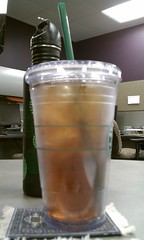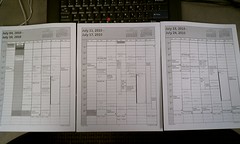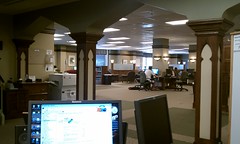Electronic Resources Librarian, Academic Library
 Arrived, turned on my computer, and while it booted up, I went and got an iced tea from the café.
Arrived, turned on my computer, and while it booted up, I went and got an iced tea from the café.
Processed new email and scanned a document that I don’t need to retain in paper.
Attended weekly department meeting. We were extra chatty today and went 15-20 min longer than normal.
Worked my way through the action item email messages due today, including updating a resource description on the website and responding to a few inquiries.
Discussed with a co-worker ways we could use GoodReads for the library staff book discussion.
Discussed QR codes and their usefulness/popularity with a co-worker. Used the opportunity to yet again show off how my Android phone is as spiffy (if not spiffier) than his iPhone. I reserve this for Apple fanboys only.
Remembered again that this is DILO librarian day and began this entry.
 Caught up on journaling accomplishments from the past three weeks. I’ll thank myself next year when I have to write my annual review. I normally try to do this at the end of each day (I use Memiary), but I’ve been lazy about it, and then overwhelmed by the backlog.
Caught up on journaling accomplishments from the past three weeks. I’ll thank myself next year when I have to write my annual review. I normally try to do this at the end of each day (I use Memiary), but I’ve been lazy about it, and then overwhelmed by the backlog.
Continued working through today’s action items while chatting with a colleague via IM about the online resource renewal decision workflow/tool that I stole from her. Well, stole the concept, anyway. Learned about something else I can steal, too.
Planned out my project schedule for the week. Then left for lunch with a friend in the dining hall..
 Back from lunch and on the Main Service Desk for two hours. Tried to track down a phone number of someone in rural Virginia. Answered an IM question from a law student about borrowing a netbook. Notified building manager that a copier is out of paper. Directed a software question to the Help Desk. Directed a product trainer to the conference room. Directed users to the bound journals. Referred a business student to the business librarian. Checked out a netbook to a user. Looked up a book for an IM user. Read some RSS feeds. Smiled at people passing by the desk.
Back from lunch and on the Main Service Desk for two hours. Tried to track down a phone number of someone in rural Virginia. Answered an IM question from a law student about borrowing a netbook. Notified building manager that a copier is out of paper. Directed a software question to the Help Desk. Directed a product trainer to the conference room. Directed users to the bound journals. Referred a business student to the business librarian. Checked out a netbook to a user. Looked up a book for an IM user. Read some RSS feeds. Smiled at people passing by the desk.
Back to my cube and sorting through the email that has come in since before lunch. Only one new action item out of the pile. Whee!
Played around with some wiki software options for a departmental intranet. Still haven’t found the right combination of features and function.
Was about to start in on a project when I noticed that there wasn’t a Technorati tag description for librarydayinthelife, so I pulled something together and submitted it. Rewarded myself with peanut butter crackers and a Coke Zero.
Finally got into my current project, which involves pulling together information about our database subscriptions so that we can easily review upcoming renewals well in advance of the deadlines. Tweaked the Access tables, queries, and reports, and then set to adding more data. Worked on this until it was time to go home.
